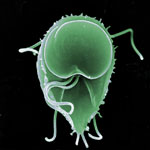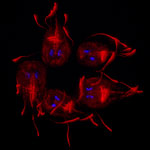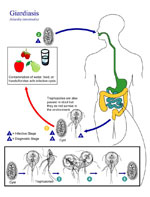 |

For further information, contact the MBL Communications Office at (508) 289-7423 or e-mail us at comm@mbl.edu
EMBARGOED until 2 pm (EST), September 27, 2007
Contact: Gina Hebert, MBL, 508-289-7725; ghebert@mbl.edu
Giardia Genome Unlocked:
Scientists Describe Highly Infectious Parasite That Often Afflicts Children and Hikers
MBL, WOODS HOLE, MA – Giardia lamblia, one of the most common human parasites in the United States, causes more than 20,000 intestinal infections a year, often through contact with contaminated drinking or swimming water. In the September 28 issue of Science, an international team led by researchers at the MBL (Marine Biological Laboratory) describe the complete genome (genetic sequence) of Giardia, which could lead to the development of new drugs to combat this persistent infection, called giardiasis... MORE>>>
Resources:
Citation:
Morrison, Hilary G. et al. Genomic minimalism in the early diverging intestinal parasite Giardia lamblia. Science, 28 September 2007, Vol. 317, Issue 5846, 1921-1926.
For full text of this paper, media can contact the Science press office, scipak@aaas.org
Photos: (Click on thumbnails for high-resolution images)
 |
 |
 |
 |
 |
Giardia lamblia trophozoite. This is the form the parasite takes while living in the intestine of a human or other animal. Scanning electron micrograph, false color. Credit: Joel Mancuso, University of California, Berkeley.
|
|
Giardia lamblia trophozoites. The microtubule cytoskeleton is immunostained (red); paired nuclei are DAPI stained (blue). Credit: Meredith Sagolla, University of California, Berkeley.
|
|
An illustration of the life cycle of Giardia lamblia. Courtesy of CDC/Alexander J. da Silva/Melanie Mose. |
Links:
Other resources on the health aspects of giardiasis:
- NIAID News Office
Phone: 301-402-1663
E-mail: niaidnews@niaid.nih.gov
- William A. Petri, Jr., MD, PhD
Chief, Division of Infectious Diseases
University of Virginia Health System
Phone: 434-924-5621 (after October 1)
E-mail: wap3g@virginia.edu
|